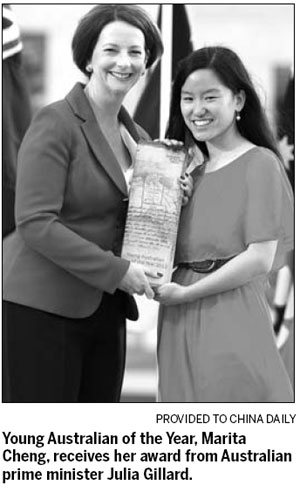Robots are not just for boys
Updated: 2012-12-26 14:53
By Li Wenfang in Guangzhou (China Daily)
|
||||||||
When Marita Cheng was a baby, her mother must have had many dreams and hopes for her little girl, but she probably never imagined that her daughter would become Young Australian of the Year, an award Cheng won this year in January.
Cheng, 23, is the first Chinese-Australian woman to be honored with the title, for her achievement in founding Robogals Global, an organization that promotes robotic engineering and technology among girls and women.
Four years before Cheng was born, her parents had moved to Cairns from Hong Kong. A month after she was born, her parents divorced, leaving Cheng and her 3-year-old brother in the hands of her mother.
Though she grew up in public housing, Cheng attributes her success to her mother's belief in education.

"She worked seven-day weeks, first as a kitchen-hand and then as a room cleaner at the Hilton Hotel in order to ensure that my brother and I got the best education she could afford," Cheng said in a speech to students at the Guangdong University of Technology early December.
"We went to Catholic schools, took piano lessons, Japanese lessons, maths, and even basketball, soccer and swimming," she says. "In return, we were expected to work hard, so that all her efforts were not in vain."
Cheng's talent in engineering may be chased back to her primary school years, when her mother made her "practice and practice maths" until she became really good at it. "Because I was really good at it, I really enjoyed it."
But it was Cheng herself who found the path to engineering.
"While in high school, I read my brother's old editions of Time magazine and was inspired by the Google guys," she says. "I thought it was amazing that technology could change the lives of so many people - and that it was created by two guys when they were in their 20s."
Her mother thought she should study medicine because it would lead to a prestigious, stable and well-paying job. So after she finished 12th grade, Cheng went to Melbourne for an interview for the medicine course at Monash University.
At the interview Cheng was asked "John's parents wanted him to study law, but he wanted to study history. What should John do?"
"While they were telling the story, I squirmed uncomfortably in my seat. They had found out I was a fake! So I said, 'John should study history because that's his passion'. After the interview ended, I called my mum and said that I was going to do engineering and that was that."
Cheng was one of five girls out of 50 students in the mechatronics engineering degree program, and she found out later that only 10 percent of engineers in the country are females.
Cheng mooted the idea of Robogals after a university project teaching robotics classes for 12-year-olds.
"If we can teach girls at one school, why don't we just teach girls at all the schools?"
Robogals aims to get girls interested in engineering and technology tertiary studies and careers. The primary activity is running robotics workshops for girls using Lego NXT robots, while explaining what engineering is and how engineers make a difference to lives, Cheng says.
Cheng even started a Robogals chapter at Imperial College London while she was on exchange for 10 months there.
At the end of this year, Cheng will pass the Robogals mantle to a successor, and she will launch a robotic-arm company.
Cheng's father came from Guangzhou, and she will be reconnected to China as she plans to manufacture in China.
"Chinese people work hard, study hard, value their elders, and like to eat. I think these are good values, and my mum always reminds me of them."
liwenfang@chinadaily.com.cn
(China Daily 12/25/2012 page20)

 Relief reaches isolated village
Relief reaches isolated village
 Rainfall poses new threats to quake-hit region
Rainfall poses new threats to quake-hit region
 Funerals begin for Boston bombing victims
Funerals begin for Boston bombing victims
 Quake takeaway from China's Air Force
Quake takeaway from China's Air Force
 Obama celebrates young inventors at science fair
Obama celebrates young inventors at science fair
 Earth Day marked around the world
Earth Day marked around the world
 Volunteer team helping students find sense of normalcy
Volunteer team helping students find sense of normalcy
 Ethnic groups quick to join rescue efforts
Ethnic groups quick to join rescue efforts
Most Viewed
Editor's Picks

|

|

|

|

|

|
Today's Top News
Health new priority for quake zone
Xi meets US top military officer
Japan's boats driven out of Diaoyu
China mulls online shopping legislation
Bird flu death toll rises to 22
Putin appoints new ambassador to China
Japanese ships blocked from Diaoyu Islands
Inspired by Guan, more Chinese pick up golf
US Weekly

|

|






